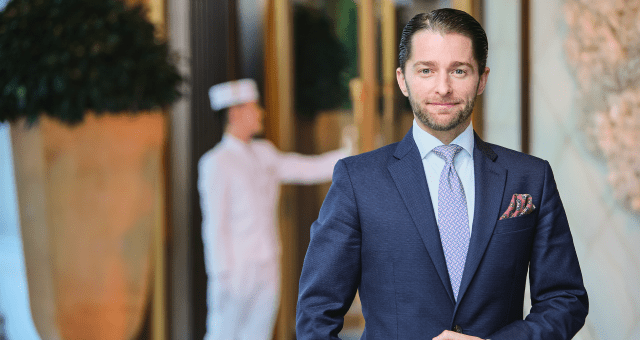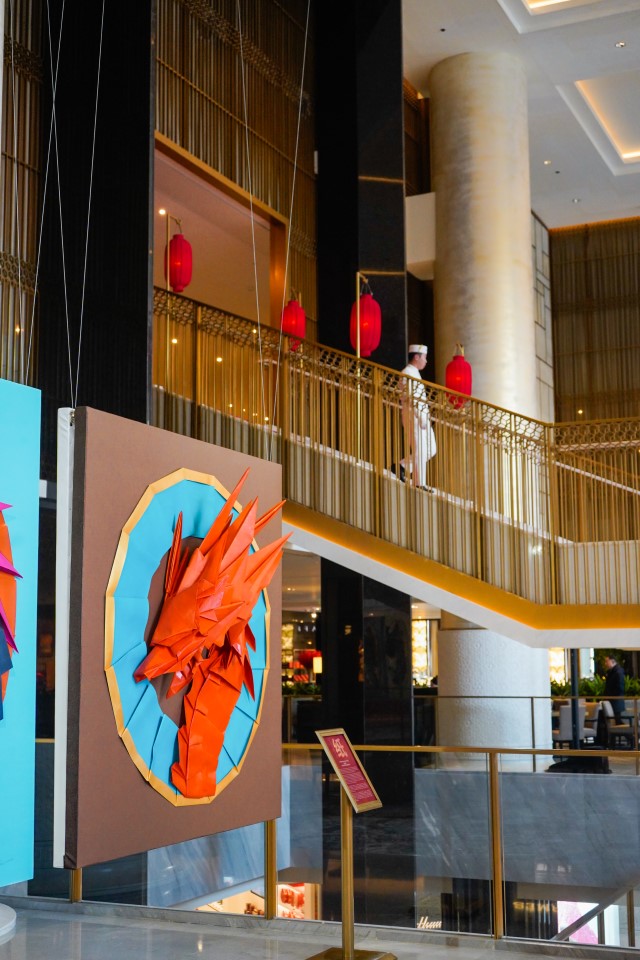Almost a year on from China’s reopening to the world, The Peninsula Beijing General Manager, Cameron Cundle, spoke to Ruth Hogan about the recovery of travel, debunking preconceptions among travellers, and rooting the guest experience in cultural connection.
Cameron, you joined The Peninsula Beijing in September 2022, when China’s borders were closed to the world. How have you seen the travel landscape recover since the reopening of borders in March 2023?
I think the recovery has been in some ways faster than it was in Thailand [Cameron’s previous posting, throughout the pandemic, was at The Peninsula Bangkok] and some other countries because major businesses and government delegations from all over the world needed to get in to China.
Before the pandemic, the hotel was predominantly international business – a 60/40 split – and of course it was 100% domestic during that time. The first big travel movement domestically was the May holiday – 1.3 billion people moving around the country – and hotel numbers and occupancy rates were all higher than pre Covid. We’ve seen the domestic part of the business balanced out with international. At the beginning of the year [2023] it was 90% domestic, now it’s about 70-75%. We are now seeing international travellers return, especially from Australia, South America and parts of Europe. It’s getting there.
Is there still a lot of hesitancy still for people to visit China, because of how severe restrictions were during that time?
In some ways, yes, that’s the reality of it. I think that’s the benefit of, for example, myself, as someone that’s on the ground, travelling and sharing these experiences. It’s not as people may think it is. It’s past anything ever shutting down again. Everything has moved on. And honestly, the economy needs it as well. It relies on tourism, so it needs to reopen, and to reinstall that confidence. I think people will, at the beginning, have that slight hesitancy. It’s the same pattern in every country.
Within The Peninsula, do you regularly engage with the other General Managers to share learnings or collaborate on things?
Yes. There’s only 12 of us, so we’re a tight-knit family. We have three properties in Greater China – Hong Kong, Shanghai, and Beijing – and the three of us [GMs] are very close. Even within Asia [Bangkok, Manila and Tokyo] and throughout Europe [Paris, London, Istanbul] and the US [Beverly Hills, Chicago and New York], It is a very tight-knit community. Through my colleagues in New York, for example, they might introduce me to travel agents there to communicate what the situation is like her in Beijing.
On the other side, when Chinese are travelling out of China, we can share the insights that we have on the ground, about the sentiment among Chinese travellers on where is safe and welcoming to travel.
Simple things can trigger a person to travel or not travel to a particular destination. It can be about certain narratives that have been spoken about, and then the truth might not always get through. We know how quickly misinformation can spread on social media, for example.
What does Chinese New Year look like at The Peninsula?
It is spectacular – the colours, the festivities, the noise – it’s all about reunion with family, which I think is beautiful. Something in Asia and China that’s so highly regarded is time with family. We’ll have big tables 15 or 16 people family members gathered around to eat the festive dishes.
Line dancing is always huge at the hotel. It’s the Year of the Dragon in 2024, so we have dragon dancing as well. We’ve created a signature event that has become this focal point in the community. We start with dancing celebrations around the gate outside. We have electric firecrackers because real ones are not permitted. They make the same noise but are environmentally friendly as there’s no smoke getting in the air – in China, anything’s possible. Then all the colourful lions come out dancing. There’s this swarm of people celebrating with our guests and the local community – it’s really something special. And of course, as a foreigner, I have to make sure I remember my steps correctly, because it means so much to people.
You have a cultural advisor at the hotel. Tell us about some of the other cultural touchpoints in the guest experience?
Yes, we have a Fung Shui master who will advise on the energy of the building and make suggestions based on that [particularly around openings or cultural events]. He’s very respectful of the fact that we are an international business and understands that we need to make the right decision for the business as well as for guests.
We offer cultural activities, whether it’s Chinese tea classes, arts and crafts, calligraphy, or embroidery – we do this in partnership with specialists within the community. The hotel should stand the test of time, it’s here for the long term and interwoven within the community.
You mentioned the importance of family in China. How are you catering to the needs of families and those multi-generational family stays?
There’s an older population in China but there’s also a very nouveau riche coming through that are willing to explore new experience and travel much more. We see that shifting in the hotel a little bit, which is quite exciting. We’re having younger families with two or three children because the one-child policy in China has been abolished.
Being an all-suite hotel, sometimes, we’ll have parents, kids and grandparents all travelling together. That’s why we came up with packages, such as a double bedroom suite package, so that families can all be in that one space. They have become hugely successful.
We also want to ensure that the children, our ‘Little Pen’ guests, have something that they can relate to as well, so we have children’s activities and themes like the Peter Rabbit-themed stay.
How do you ensure the hotel is accessible to senior family members and those with disability?
My brother is a wheelchair user, so this is something that I am always thinking about. We have accessible rooms, but it’s about making sure that each room has that ability to be transformed, as per the guests needs – that the taps can be extended or that the shower can accommodate a wheelchair if need be. That’s something we’ve worked hard on because the population is aging. It’s so important that whether it’s a child, a small or large family, someone in a wheelchair, or someone on business, that everyone gets to experience what they want, how they want, at the pace that they want to.
What are some of your main objectives at The Peninsula Beijing in 2024?
In terms of our numbers, we’ve surpassed 2019 figures, so it’s about continuing that growth and solidifying our position within the market. 2024 marks our 35th anniversary, so we’ll have some celebrations around that, which is very exciting. We’re focused on getting that international market back into Beijing; we don’t know whether we will get back to that 60/40 split but I think we will get to that balance of 50/50, no doubt. We will continue working with artists, listening to our guests, and improving our offerings. We want to stay best in market.
This interview was published in HM Magazine’s February 2024 edition. Click here for more.








